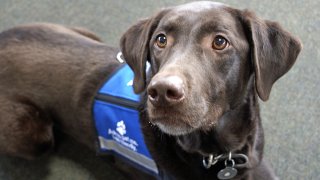
Bruce Brown sought help at the Hampton VA Medical Center when his drinking began getting out of control.
Now he's reclaiming his life one step at a time.
Still, he needs help during rough patches.
"On the weekends, things are quiet," said Brown, a 36-year-old Army veteran. "For myself, I don't deal with silence too well. Depression kicks in. Anxiety."
Enter rottweilers CoHo and Bella, who make weekend visits to the hospital's domiciliary, where Brown and others are temporarily staying.
These trained therapists boost sagging spirits with their cold noses and floppy tongues. They sit. They stay. They might even shed.
But no one is complaining.
Local
Washington, D.C., Maryland and Virginia local news, events and information
"When the dogs come, they tend to ease my mood," said Brown. "I enjoy having them. It's unconditional love, for sure."
The therapy dogs visit on weekends and even have time for parties. On Dec. 20, a number of Rottweilers and other dogs descended on the domiciliary for a grand Christmas party.
The dogs are under the watchful eye of Renice Zimmerman of Yorktown. She's a therapy dog handler who also volunteers with Crisis Response Canines, a New Jersey-based nonprofit with certified K9 teams that respond to personal or community crises, including the Virginia Beach shooting earlier this year.
Zimmerman, a former Army nurse, has been around rottweilers for more than 30 years. She lost her husband, an Army colonel, in 2006. That led to her involvement in survivor outreach services, including the Tragedy Assistance Program for Survivors (TAPS).
Her rottweiler, Wynd, who has since passed away, starting coming along for those visits.
"I saw how calming she was," Zimmerman said. "I guess it kind of took off from there."
When her husband introduced her to rottweilers in the 1980s, Zimmerman recalled seeing "The Omen," a 1976 horror firm that cast a menacing rottweiler as the protector of a child destined to be the Antichrist.
That was Hollywood.
The American Kennel Club describes "rotties" as loyal, loving, confident guardians. Zimmerman said the dogs are intelligent and intuitive. They can tell if someone needs them. They are especially popular with veterans and military personnel. That's a large part of her target audience, which includes trips to Fort Eustis and Naval Medical Center Portsmouth.
In her experience, veterans and service members gravitate to larger dogs than, say, a chihuahua.
"They want a dog that they consider an equal, a battle buddy," she said. "They don't want little dogs, as a rule, coming to visit them. They want a dog they can get on the floor with."
Jennie Bisese agrees. During a recent therapy visit, she sat on the floor and gave vigorous belly rubs to CoHo, whose name stands for Code of Honor. At 2 years old, CoHo weighs in at a solid 90 pounds, but Bisese calls him her "little angel."
"It's just like a fresh page every time you see them," said Bisese, an Army veteran from Norfolk. "They're just happy."
Tim Russ, a 22-year retired Navy senior chief who deployed nine times, is living at the domiciliary and working through PTSD-related issues. He worked with military dogs later in his naval career, when he served as a master of arms. And he's been a dog person pretty much his entire life.
He enjoys interacting with CoHo and Bella, and he notices what they do for other veterans.
"The people you normally see around here are enclosed in themselves and don't come out of their rooms," he said. "When they're sitting somewhere alone, the dog comes up and you see them opening up. You see their spirit come up. It's very good to see them come out of their shell."
While therapy dogs undergo rigorous training, they must also possess an innate ability to provide comfort, Zimmerman said. They either have it or they don't. The mentality is different than a service dog.
"They have to want to visit with everybody," she said. "A service dog is trained for one person. A therapy dog is everybody's dog. They give of themselves with no expectations back. It's unconditional."



